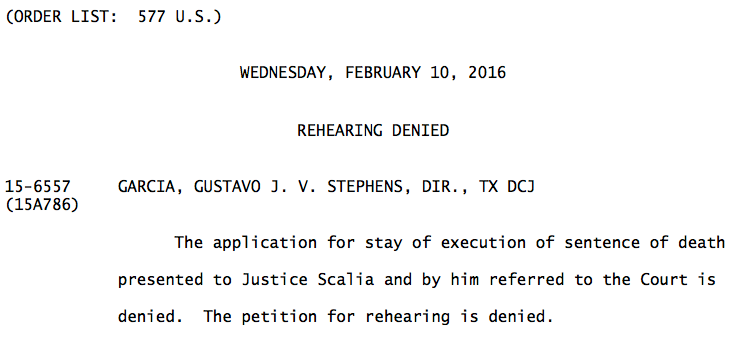Last night President Obama announced that he will nominate a replacement in due course. Names are already floating around, and I won’t dwell on the short list here. Senate Republicans have several options of how to proceed.
- First, Senate Republicans, through Judiciary Chairman Chuck Grassley, can refuse to schedule a hearing between now and January 2017.
- Second, a hearing can be scheduled, and the committee votes down President Obama’s nominee (whomever he or she may be).
- Third, the nominee is voted out of committee, but Senate Majority Leader Mitch McConnell refuses to bring the nominee to a floor vote.
- Fourth, the nominee is brought to a floor vote, and fails to secure 60 votes to be confirmed. At that point, depending how long it takes, President Obama could make another nomination, and the process starts all over again.
As I will explain in a piece to be published in National Review tomorrow, the Senate has no constitutional duty to confirm any nominees (the unanimous decision in Noel Canning proved this point). However, the failure to confirm a nominee may come at a political cost. It is always difficult to predict how different counterfactuals will play out, but I can see a few different paths.
If the Senate Republicans choose door number one, pressure will mount in fairly short order to take some action. Already, moderates like Lindsay Graham are calling for a “consensus” nominee. Jeb Bush said “it’s “really not important to me” whether there’s a vote before the election. John Kasich said during the debate that a nominee that is palatable to all should be considered. This will build, especially once Obama actually nominates someone.
If the Senate Judiciary Committee holds a hearing, then the pressure to vote up or down on a nominee will become very serious. In recent memory, the only Justice to be voted down by the full Senate was Robert Bork, and even he made it out of committee under the chairmanship of Sen. Joe Biden.
If the candidate makes it out of committee, Senate Majority Leader McConnell will have to keep his caucus strong, and prevent any possible defects who would force him to bring the candidate up for a vote. But at this point, a floor vote looks likely.
If in fact a vote is held, so long as the 60-vote requirement is maintained, Democrats would need to peel off 14 Senate Republicans.
Now throughout all of this, Senate Republicans will be faced with a choice. Moving ahead on an Obama nominee will infuriate the base–especially in an election year. Alternatively, not moving ahead with an Obama nominee may put certain vulnerable seats in jeopardy. I have no idea which risk is greater. But if in fact the Senate is lost, then here is a fifth option that is a distinct possibility.
Assume a Republican wins the White House in 2016, but the Democrats take the Senate. The new Senate meets on January 3, 2017. President Obama remains in office until January 20, 2017, when the new President is inaugurated. There is absolutely nothing stopping Senate Majority Leader Schumer from fast-tracking a nomination for the Supreme Court in the intervening seventeen days. Sure there are committee rules to violate, and other parliamentary irregularities, not to mention the need to invoke the nuclear option for SCOTUS, but all that is feasible. Senate Democrats would have no compunction about doing so if they feel slighted by Senate Republicans who held up Obama’s nominee for 11 months.
From my humble perspective, options number 1 through 4 only work if the Republicans win both the Senate and the White House. If there is a Democratic President and a Democratic Senate on January 4, the entire issue is moot, and Pres. Obama can nominate whomever he wishes.
I close with an insightful essay from Charles C.W. Cooke, who offers some sage advice about the path forward:
Well, because to the average person watching the fight, one seems reasonable and the other does not. This, remember, is a political fight. Certainly, there is nothing in Article II that requires the Senate to move on the president’s recommendation. Hell, there is nothing in Article II that prevents the Court from having an eight-person staff in perpetuity. But, in winning hearts and minds, “no, no, no, no, no!” is a less attractive proposition than “the president keeps nominating candidates who are unacceptable to us, and we were elected to stop that.” As the strategy unfolds, Republicans might think about better honing their arguments. Already, the Democratic party will be able to undermine whatever specific criticisms are likely to be forthcoming by saying, “they were opposed to this guy before he was even named.” Given Obama’s track record, that approach may be prescient; but it’s not especially smart PR.
There are no ideal options for the Senate Republicans, but it is important to understand the different ways this can play out.
Disclosure: I support Sen. Cruz for President.

